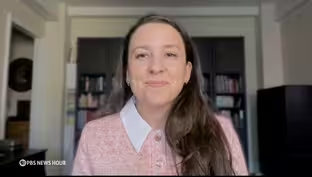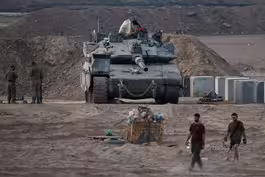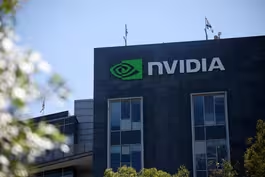
Trump decries crime, but has slashed prevention efforts
Clip: 8/13/2025 | 8m 34sVideo has Closed Captions
Trump decries crime rates, but his administration has slashed prevention efforts
President Trump moved to take over policing in Washington, D.C. to “rescue our nation’s capital from crime," but the data doesn’t back up many of his claims. Murder and violent crime dropped significantly across the U.S. last year, a trend that’s continued so far in 2025. The crackdown comes even as his administration cut funding for other kinds of crime prevention work. John Yang reports.
Problems playing video? | Closed Captioning Feedback
Problems playing video? | Closed Captioning Feedback
Major corporate funding for the PBS News Hour is provided by BDO, BNSF, Consumer Cellular, American Cruise Lines, and Raymond James. Funding for the PBS NewsHour Weekend is provided by...

Trump decries crime, but has slashed prevention efforts
Clip: 8/13/2025 | 8m 34sVideo has Closed Captions
President Trump moved to take over policing in Washington, D.C. to “rescue our nation’s capital from crime," but the data doesn’t back up many of his claims. Murder and violent crime dropped significantly across the U.S. last year, a trend that’s continued so far in 2025. The crackdown comes even as his administration cut funding for other kinds of crime prevention work. John Yang reports.
Problems playing video? | Closed Captioning Feedback
How to Watch PBS News Hour
PBS News Hour is available to stream on pbs.org and the free PBS App, available on iPhone, Apple TV, Android TV, Android smartphones, Amazon Fire TV, Amazon Fire Tablet, Roku, Samsung Smart TV, and Vizio.
Providing Support for PBS.org
Learn Moreabout PBS online sponsorshipAMNA NAWAZ: The Trump administration moved this week to take over policing in Washington, D.C., and yesterday deployed the National Guard in the city, claiming a spike in crime.
The president has suggested similar action could be taken in other cities.
But the data doesn't back up many of his claims.
Murder and violent crime dropped significantly across the U.S. last year, a trend that's continued so far in 2025.
And, as John Yang reports, the federal law enforcement crackdown comes even as the administration cuts funding for other kinds of crime prevention work.
JOHN YANG: This summer basketball league in West Detroit is about more than just layoffs and dribbling.
These young men are part of FORCE Detroit, a nonprofit group focusing on community violence intervention, or CVI.
The goal?
Stop conflicts before they escalate.
MAN: We got to take the emotions out of it.
It's the scrimmage.
One, two, three.
JOHN YANG: FORCE Detroit targets people at risk of either committing or becoming victims of violence, offering services like mental health support and career placement.
MAN: I couldn't even think of where I'd be without FORCE right now, to be honest.
MAN: One of my main goals was to get back in school.
And they asked me to help me get back in school.
(CROSSTALK) JOHN YANG: The group relies on the influence of people whose backgrounds give them credibility in their communities, like executive director DuJuan "Zoe" Kennedy.
He grew up in this neighborhood and spent almost 15 years in prison on manslaughter and drug charges.
DUJUAN "ZOE" KENNEDY, Executive Director, FORCE Detroit: If a house is shot at in our community, we go do outreach, figure out who's responsible or who they're saying responsible, and we're going to try to negotiate and mitigate that conflict.
Mitigation can give you the time you need to really develop a person and change a person's core belief.
JOHN YANG: For decades, Detroit had the reputation of a blighted city plagued by violent crime.
But now parts of the city are showing signs a revival, and crime has plummeted.
Last year, non-fatal shootings dropped 25 percent and the city had its fewest homicides since 1965.
But now some worry that progress is in jeopardy.
In April, the Justice Department terminated almost $170 million in grants for CVI efforts across the country, including roughly $2 million for FORCE Detroit.
In a statement to PBS News, the Justice Department said: "Many grant recipients provided indirect and often vague support to law enforcement or crime victims.
Organizations seeking taxpayer money must show how their programming will further the administration's priorities and help improve public safety."
DUJUAN "ZOE" KENNEDY: Here you have an administration that would make up excuses why this type of stuff shouldn't be done.
Why would you want to stop something that's not just saving people's lives, that's bringing quality of life to a community?
JOHN YANG: In 2023, Detroit launched a program called ShotStoppers.
It helps measure the success of groups like FORCE Detroit.
It works like this.
CVI organizations devise strategies to tackle violence in their own parts of the city.
Groups get bonus funding if shootings in those areas drop more than in the rest of Detroit.
Last fall, for the first time, all six areas achieved that goal, with reductions between 37 and 83 percent, compared with a 35 percent decline outside those zones.
TODD BETTISON, Detroit, Michigan, Police Chief: This right here saves lives.
JOHN YANG: Detroit Police Chief Todd Bettison helped create ShotStoppers when he was deputy mayor.
TODD BETTISON: I can't put a police officer on every block 24 hours a day, but those community violence interrupters, they're able to move and influence in a way that we don't.
JOHN YANG: But there are skeptics.
In some cities with CVI groups, crime has gone up.
CHARLES FAIN LEHMAN, Fellow, Manhattan Institute: I do not think that the available research really has attempted to evaluate in the way that I would want to evaluate whether or not CVI works as an intervention.
JOHN YANG: Charles Fain Lehman studies crime at the conservative Manhattan Institute.
CHARLES FAIN LEHMAN: I think there are lots of other more promising interventions, both things that we know work like policing.
We have a lot of evidence to policing works, and also things that I would like to invest in more at the margins.
If you force me to choose between starting a community violence intervention program and fixing all the street lighting in my city, I would fix all the street lighting, because I know that works.
JOHN YANG: Nationwide, the federal cuts have left dozens of similar programs scrambling.
Tyrone Kent is the director of a CVI group called Roca Baltimore, a city that's also fought a high crime reputation.
But through July, Baltimore saw its fewest homicides in more than 50 years.
TYRONE KENT, Director, Roca Baltimore: We still have work to do because, even though the numbers decreased, we're still talking about losing lives in the city.
JOHN YANG: Roca focuses on those at the center of gun violence, young men like Savion Hardison.
SAVION HARDISON, Roca Baltimore Participant: Those young people, to jail with them.
JOHN YANG: Hardison survived a shooting when he was just 15 and has been in and out of jail for the better part of a decade.
Thanks to Roca, he has a job and is working on communication and coping skills.
SAVION HARDISON: If there's less programs like Roca, then there's more crime.
Why not keep the funding going?
Why not have more funding to help?
Because it's working.
DEANDRA GORDON, Roca Baltimore: We going to be there no matter what.
JOHN YANG: Roca has an active caseload of about 250.
Persistence is a key part of its model, sometimes making dozens of visits before a young person takes the first step and agrees to talk.
DeAndra Gordon is an assistant director.
DEANDRA GORDON: We see there's no food in the refrigerator.
We see you don't have no furniture.
We see the lights off or whatever the case may be.
So us, as Roca, we can meet that, so that you're comfortable enough with us to where it goes you can start to at least listen and give us the opportunity to show you what we can offer.
JOHN YANG: In April, the Justice Department clawed back about half of the $2 million grant Roca Baltimore received in 2022, despite the objections of Maryland's governor and Baltimore's police department.
While Roca's appeal is pending, it's had to cut staff and pause referrals for new clients.
TYRONE KENT: The programs are definitely needed.
Without these programs, the city will be -- it would be disastrous.
JOHN YANG: Charles Fain Lehman says he'd rather see federal dollars spent on things like hiring more local police.
CHARLES FAIN LEHMAN: In order for community violence intervention to work, a lot of things have to go right.
Sometimes, it works, and that's fantastic, but there are many more points at which failure is possible in that approach than there are in much simpler criminal justice tools like arrest or incarceration.
LATONYA "ABYS" DENSON, Founder, Abu Unity Incorporated: It's crazy because the violence can go up and law enforcement funding will go up.
JOHN YANG: Earlier this month, LaTonya "Abys" Denson attended a CVI leadership academy at the University of Chicago.
She started Abu Unity Incorporated in Newport News, Virginia, after her daughter's father was killed by gun violence.
Violent crime in Newport News went up about 12 percent in the first five months of the year.
LATONYA "ABYS" DENSON: For some reason, with community violence intervention and prevention programs, if violence goes up, there's a whoa, whoa, we can't fund you any longer because something's not working.
Just like with law enforcement, just give us the opportunity to continue to do the work.
JOHN YANG: In May, five groups whose grants were canceled by the Justice Department went to court to get the money restored.
A federal judge called the cuts shameful, likely to harm communities and individuals vulnerable to crime and violence.
But, he said, the court lacked jurisdiction and he dismissed the case.
The plaintiffs, including FORCE Detroit, are appealing.
DUJUAN "ZOE" KENNEDY: Imagine someone being 20 to 30 feet away from you, bleeding, dying, and you're trying to get over there.
You got people throwing stuff, putting stuff in your way, pushing you.
That's what it feels like.
It feels like somebody's actually trying to prevent you from saving all the people you grew up around in the community that you live in.
JOHN YANG: For the "PBS News Hour," I'm John Yang in Detroit.
How a far-right activist is shaping the Trump administration
Video has Closed Captions
Clip: 8/13/2025 | 6m 12s | How far-right activist Laura Loomer is shaping the Trump administration (6m 12s)
How Maryland's riverkeepers protect the state's waterways
Video has Closed Captions
Clip: 8/13/2025 | 2m 46s | How Maryland's riverkeepers protect the state's waterways (2m 46s)
Ms. Rachel opens up about advocating for Gaza's children
Video has Closed Captions
Clip: 8/13/2025 | 8m 58s | Ms. Rachel on advocating for Gaza's children: 'I wish leaders would hear their voices' (8m 58s)
News Wrap: At least 25 people killed at Gaza aid sites
Video has Closed Captions
Clip: 8/13/2025 | 5m 15s | News Wrap: At least 25 people seeking help killed at Gaza aid sites (5m 15s)
Trump’s AI chip deal sparks legal questions
Video has Closed Captions
Clip: 8/13/2025 | 5m 32s | Trump’s AI chip deal sparks legal questions and national security concerns (5m 32s)
Trump says Putin will face consequences if he won't end war
Video has Closed Captions
Clip: 8/13/2025 | 7m 57s | Ahead of summit, Trump says Russia will face consequences if Putin won't end Ukraine war (7m 57s)
Providing Support for PBS.org
Learn Moreabout PBS online sponsorshipSupport for PBS provided by:
Major corporate funding for the PBS News Hour is provided by BDO, BNSF, Consumer Cellular, American Cruise Lines, and Raymond James. Funding for the PBS NewsHour Weekend is provided by...

















